|
|
|
Sort Order |
|
|
|
Items / Page
|
|
|
|
|
|
|
| Srl | Item |
| 1 |
ID:
187567
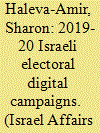

|
|
|
|
|
| Summary/Abstract |
This article focuses on the three Israeli digital campaigns during 2019–20 elections through their most prominent negative trends, namely: fake news, accounts and identities; politicians’ chat bots; influence and interruption networks, illegal information accumulation on Israeli citizens via social media and voting apps; anonymous and fake spam, and a complete lack of compliance with the statutory and regulatory framework. With technology’s speedy advancement, legal tools’ lagging, and political actors’ exploitation of the situation to their benefit, it seems that these campaigns, setting forth a fifth phase of political communication – Algorithmic Campaigns – constitute a rather bleak and grim future, as far as elections are concerned, thereby calling for rethinking.
|
|
|
|
|
|
|
|
|
|
|
|
|
|
|
|
| 2 |
ID:
147233
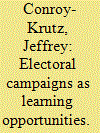

|
|
|
|
|
| Summary/Abstract |
While scholars have studied various aspects of election campaigns, they have not examined their effects on political knowledge in Africa. Since many problems are blamed on information scarcity, campaign-related learning could affect democratic development positively. This article focuses on the case of Uganda, using unique panel data from the 2010–11 campaign. I find that knowledge on office holders, candidates, and institutions increased significantly over the campaign. Importantly, these increases were not concentrated amongst the previously privileged, but also occurred amongst often-disadvantaged groups, such as women, the poor, the less-educated, and rural dwellers. In fact, the campaign seems to have diminished, although not eliminated, pre-existing knowledge gaps between advantaged and disadvantaged populations. It does not appear that Ugandans learned because the campaign made them more excited about politics, but rather because they were exposed to political communications, door-to-door canvassing, and increasingly politicized media content. Finally, knowledge increases are significantly correlated with increased criticism of institutions, but not with increased support for democracy or participation. While we cannot generalize to the rest of the continent, given that interest in a non-competitive campaign like Uganda's might be relatively limited, we might expect similar or larger learning effects in more-democratic settings.
|
|
|
|
|
|
|
|
|
|
|
|
|
|
|
|
| 3 |
ID:
154514
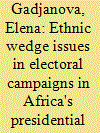

|
|
|
|
|
| Summary/Abstract |
Formulating ethnic wedge issues is an important, yet overlooked, strategy for cross-ethnic mobilization in Africa's presidential regimes where coalitions are needed to win elections. Ethnic wedge issues are rhetorical tools intended to splinter the support of a key opponent by employing narratives of ethnically motivated discrimination, victimization, or exclusion, and promising remedial action. They are often put forward by challengers and target minorities within incumbents’ coalitions for whom ethnicity is salient, who vote as a bloc, and who are a regional majority. Ethnic wedge issues can inflame ethnic resentments, entrench existing conflicts, and limit the space for compromise on contentious issues. Drawing on an analysis of recent presidential campaigns in Kenya and Zambia, this article illustrates the logic of the use of ethnic wedge issue appeals, as the salience of ethnicity varies within countries. It contributes to the growing literature on parties’ voter outreach strategies in sub-Saharan Africa. The research has implications for the continued salience of ethnicity in plural societies and for the structure of political cleavages in Africa's democratizing states.
|
|
|
|
|
|
|
|
|
|
|
|
|
|
|
|
| 4 |
ID:
119516
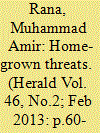

|
|
|
| 5 |
ID:
119512
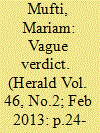

|
|
|
|
|
|
|
|